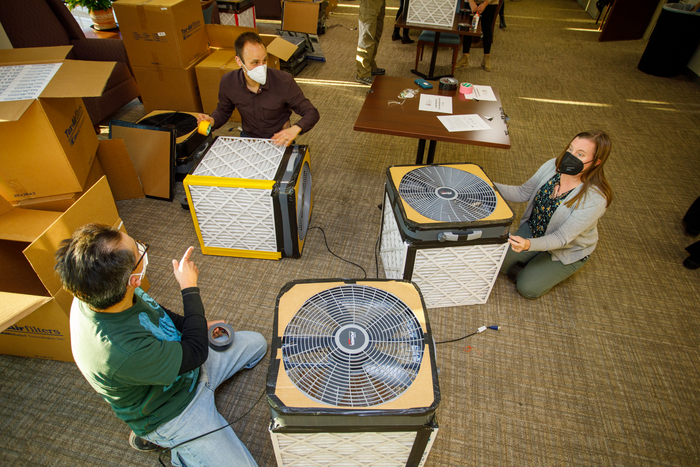PROVIDENCE, R.I. [Brown University] — A team of researchers from Brown University’s School of Public Health, Brown’s School of Engineering and Silent Spring Institute found that simple air filtration devices called Corsi-Rosenthal boxes are effective at reducing indoor air pollutants.

Credit: Photo: Ken Zirkel
PROVIDENCE, R.I. [Brown University] — A team of researchers from Brown University’s School of Public Health, Brown’s School of Engineering and Silent Spring Institute found that simple air filtration devices called Corsi-Rosenthal boxes are effective at reducing indoor air pollutants.
The study, which analyzed the effectiveness of Corsi-Rosenthal boxes installed at the School of Public Health to help prevent the spread of COVID-19, is the first peer-reviewed study of the efficacy of the boxes on indoor pollutants, according to the authors.
Lowering indoor air concentrations of commonly-found chemicals known to pose a risk to human health is a way to improve occupant health, according to lead author Joseph Braun, an associate professor of epidemiology at Brown.
“The findings show that an inexpensive, easy-to-construct air filter can protect against illness caused not only by viruses but also by chemical pollutants,” Braun said. “This type of highly-accessible public health intervention can empower community groups to take steps to improve their air quality and therefore, their health.”
Corsi-Rosenthal boxes, or cubes, can be constructed from materials found at hardware stores: four MERV-13 filters, duct tape, a 20-inch box fan and a cardboard box. As part of a school-wide project, boxes were assembled by students and campus community members and installed in the School of Public Health as well as other buildings on the Brown University campus.
To assess the cubes’ efficacy at removing chemicals from the air, Braun and his team compared a room’s concentrations of semi-volatile organic compounds before and during the box’s operation.
The results, published in Environmental Science & Technology, showed that Corsi-Rosenthal boxes significantly decreased the concentrations of several PFAS and phthalates in 17 rooms at the School of Public Health during the period they were used (February to March 2022). PFAS, a type of synthetic chemical found in a range of products including cleaners, textiles and wire insulation, decreased by 40% to 60%; phthalates, commonly found in building materials and personal care products, were reduced by 30% to 60%.
PFAS and phthalates have been linked to various health problems, including asthma, reduced vaccine response, decreased birth weight, altered brain development in children, altered metabolism and some cancers, said Braun, who studies the effect of these chemicals on human health. They are also considered to be endocrine-disrupting chemicals that may mimic or interfere with the body’s hormones. What’s more, PFAS have been associated with reduced vaccine response in children and also may increase the severity of and susceptibility to COVID-19 in adults.
“The reduction of PFAS and phthalate levels is a wonderful co-benefit to the Corsi-Rosenthal boxes,” said study co-author Robin Dodson, a research scientist at Silent Spring Institute and expert in chemical exposures in the indoor environment.. “These boxes are accessible, easy to make and relatively inexpensive, and they’re currently being used in universities and homes across the country.”
“The Corsi-Rosenthal box was designed to be a simple, cost-effective tool to promote accessible and effective air cleaning during the COVID-19 pandemic; the fact that the boxes are also effective at filtering out air pollutants is a fantastic discovery,” said Richard Corsi, one of the inventors of the boxes and dean of the College of Engineering at the University of California, Davis. “I am thrilled that researchers at Brown University and Silent Spring Institute have identified a significant co-benefit of the boxes with respect to reduced exposure to two harmful classes of indoor pollutants: PFAS and phthalates.
The sentiment was echoed by Jim Rosenthal, Corsi’s collaborator and CEO of Air Relief Technologies, the company that manufactures the MERV-13 filters used in Corsi-Rosenthal Boxes.
“This interesting research showing that the air filters not only reduce particles carrying the SARS-CoV-2 virus but also reduce other indoor air pollutants could be very significant as we continue to work to create cleaner and safer indoor air,” Rosenthal said.
The researchers also found that the Corsi-Rosenthal boxes increase sound levels by an average of 5 decibels during the day and 10 decibels at night, which could be considered distracting in certain settings, such as classrooms. However, Braun said, the health benefits of the box likely outweigh the audio side effects.
“The box filters do make some noise,” Braun said. “But you can construct them quickly for about $100 per unit, with materials from the hardware store. They are not only highly effective but also scalable.”
Brown study authors include Kate Manz and Kurt Pennell from the School of Engineering, and Jamie Liu, Shaunessey Burks and Richa Gairola from the School of Public Health. This research was supported by the National Science Foundation and the National Institute of Environmental Health Sciences.
Journal
Environmental Science & Technology
DOI
10.1021/acs.est.2c05169
Method of Research
Observational study
Subject of Research
Not applicable
Article Title
Using Corsi-Rosenthal Boxes to Mitigate COVID-19 Transmission Also Reduce Indoor Air Concentrations of PFAS and Phthalates?
Article Publication Date
23-Dec-2022
COI Statement
Competing financial interests: Joseph Braun was financially compensated for his services as an expert witness for plaintiffs in litigation related to PFAS-contaminated drinking water.




